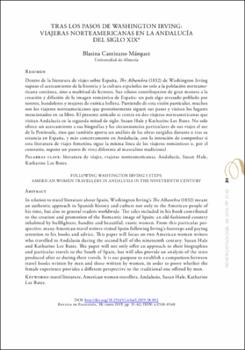Tras los pasos de Washington Irving: viajeras norteamericanas en la Andalucía del siglo XIX
Fecha
2019Resumen
Dentro de la literatura de viajes sobre España, The Alhambra (1832) de Washington Irving
supuso el acercamiento de la historia y la cultura españolas no solo a la población norteamericana
coetánea, sino a multitud de lectores. Sus relatos contribuyeron de gran manera a la
creación y difusión de la imagen romántica de España: un país algo atrasado poblado por
toreros, bandoleros y mujeres de exótica belleza. Partiendo de esta visión particular, muchos
son los viajeros norteamericanos que posteriormente siguen sus pasos y visitan los lugares
mencionados en su libro. El presente artículo se centra en dos viajeras norteamericanas que
visitan Andalucía en la segunda mitad de siglo: Susan Hale y Katharine Lee Bates. No solo
ofrece un acercamiento a sus biografías y las circunstancias particulares de sus viajes al sur
de la Península, sino que también aporta un análisis de las obras surgidas durante o tras su
estancia en España, y más concretamente en Andalucía, con la intención de comprobar si
esta literatura de viajes femenina sigue la misma línea de los viajeros románticos o, por el
contrario, supone un punto de vista diferente al masculino tradicional. In relation to travel literature about Spain, Washington Irving’s The Alhambra (1832) meant
an authentic approach to Spanish history and culture not only to the American people of
his time, but also to general readers worldwide. The tales included in his book contributed
to the creation and promotion of the Romantic image of Spain: an old-fashioned country
inhabited by bullfighters, bandits and beautiful, exotic women. From this particular perspective,
many American travel writers visited Spain following Irving’s footsteps and paying
attention to his books and advice. This paper will focus on two American women writers
who travelled to Andalusia during the second half of the nineteenth century: Susan Hale
and Katharine Lee Bates. The paper will not only offer an approach to their biographies
and particular travels to the South of Spain, but will also provide an analysis of the texts
produced after or during their travels. It is our purpose to establish a comparison between
travel books written by men and those written by women, in order to prove whether the
female experience provides a different perspective to the traditional one offered by men.





